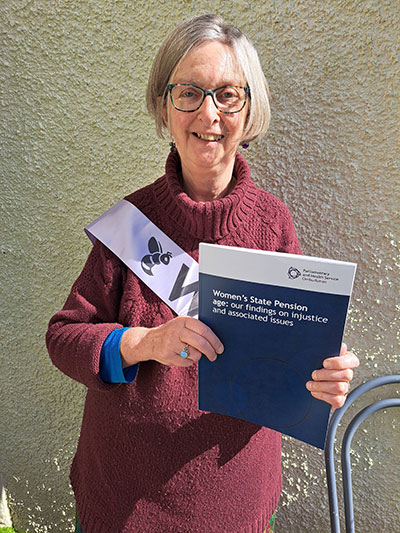Many women in the UK will be forced to give up caring roles to seek employment, due to changes in the age at which they qualify for the state pension.

WASPI vice chair Pamela Judge says women born in the 1950s who saw the state pension age rise have been forced to choose between taking on roles as family carers and remaining in work
That’s the view of campaign group Women Against State Pension Inequality (WASPI).
Not enough notice
The group says women born in the 1950s were not given enough notice when the state pension age was equalised at 65.
WASPI campaigners say many of these women found out too late to alter their retirement plans.
They had too little time to arrange to provide an income until they reached the new retirement age.
‘Dire financial straits’
As a result, they have been left “in dire financial straits”. One in three is in debt as a result, the campaigners say.
Last week, the Parliamentary and Health Service Ombudsman said government ministers should address the injustice caused to more than 3.8 million women.
It recommended that the women receive an apology and pay-outs of between £1,000 and £2,950.
A petition has been launched to force the compensation.
It says: “The Parliamentary and Health Service Ombudsman has confirmed that WASPI women are due compensation. But the Department of Work and Pensions refuses to comply.”
Click here to see the petition.
Retirement age equalised
The 1995 Pensions Act equalised the age when men and women could start drawing on their retirement pot.
The qualifying age for women rose from 60 to 65.
The retirement age for men and women now stands at 66. It has risen because we are living longer.
Caring plans ‘went out the window’
Pamela Judge, 69, from Newcastle Emlyn in West Wales, is the vice chair of WASPI.
She said the plans that many women made to be carers “went out the window” when the UK Government equalised the pension age.
Judge added: “That didn’t just have a knock-on effect on them, but it then had a knock-on effect on the members of the family that they were going to look after.”
The campaigners also argue that changing the state pension age for women born in the 1950s was unfair. They say that’s because many started their working lives much earlier, with some leaving school at 14.
Commitment to ‘sustainable’ support
In a statement, a spokesperson for the Department for Work and Pensions said it would support pensioners in a “sustainable way” while being fair to “them and taxpayers”.
Pension payments will rise again by 8.5 per cent in April, added the spokesperson.
Related:
- Families gain right to break from caring
- Continuing healthcare fails families
- Adults fear death in poor healthcare
Published: 3 April 2024















